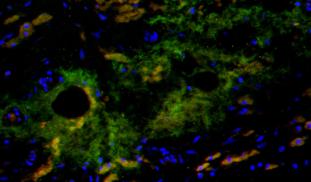39
0
0
Like?
Please wait...
About This Project
We study a special group of Stem Cells that reside in the Bone Marrow called mesenchymal stem cells (MSC). We believe that the MSC are deficient in patients with a failing hip or knee implant. We hope that a close examination of these stem cells will allow us to develop therapies that could prolong the life of a failing implant.

Browse Other Projects on Experiment
Related Projects
Shutting down cancer’s recycling system with exosome-based therapy
Pancreatic cancer is one of the deadliest cancers because its cells survive by recycling their own components...
Developing a novel oxysterol antibiotic to combat drug-resistant tuberculosis
Drug-resistant tuberculosis (TB) is a consistently growing threat to global health. We have developed Oxy291...
Tote-Size portable incubator for rapid field work
Waiting for lab results is slowing science down! We are designing a fully open source portable incubator...

